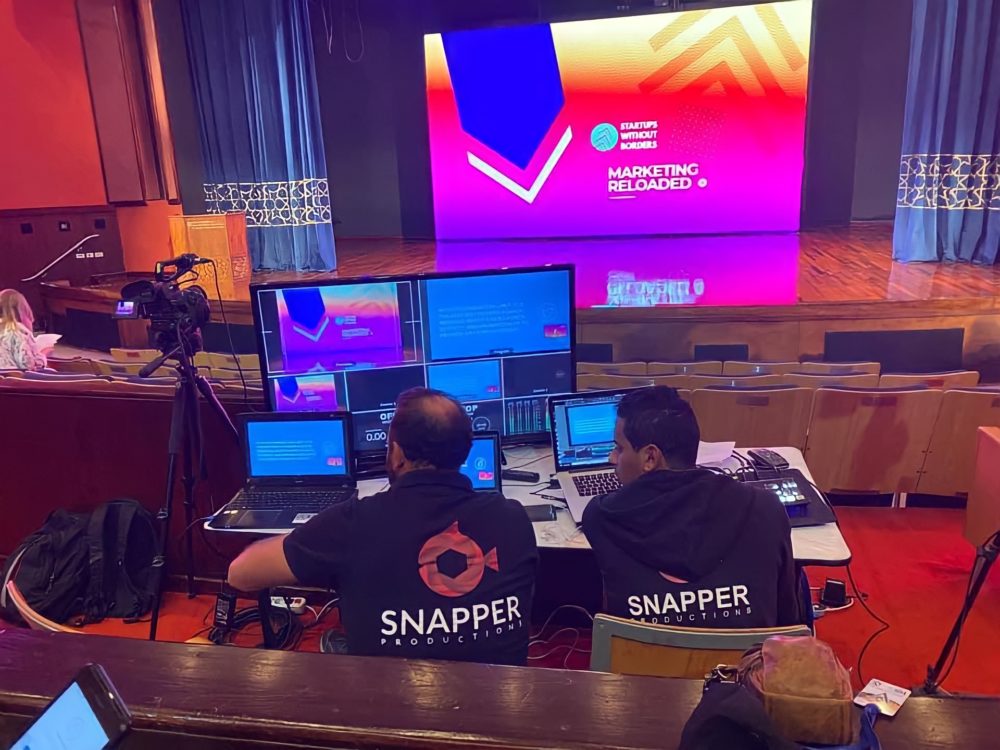For startups looking to expand and adapt during the pandemic era and the accelerated digital transformation it brought about, Marketing Reloaded provided plenty of crucial answers to puzzling questions. We mean that literally, too—there was a question bar below the event’s live stream so that attendees could engage with speakers who excel at everything related to digital presence and growth hacking.
All of the concepts discussed, wisdom imparted and masterclasses delivered were uniquely applicable to our current pandemic situation, and anticipated future. It posed questions about the fast-paced evolution of the nature of the workplace, how to adapt to it, and whether these changes were necessarily for the better.
The day was packed with key insights on maintaining meaningful consumer relationships, leveraging trending concepts like growth hacking, and negotiating mutually beneficial contracts with social media influencers.
If you missed it, we’ll show you a glimpse of what’s been presented. But you should follow Startups Without Borders’ here for updates on their future events and even more insights from Marketing Reloaded.
We spent all day absorbing the wisdom and expertise of the speakers and have distilled many of it into a few key points to tide you over until the full videos are released.
1. How do you Build a Distinctive Brand Personality as the Consumers’ Nature Keeps Changing?
These days, younger consumers have become generally more socially conscious. Although they still want convenience, they’re also interested in supporting businesses whose values at least appear to align with their own. For instance, those that consider themselves to be ethical consumers might seek to buy from businesses that are sustainable, family-run, vegan, local, eco-friendly, or black-owned—amongst many other reasons.
Jessy El Murr, the revered journalist for Forbes Middle East, introduced her panel discussion with Amy Mowafi, the CEO of MO4 Network; and Akanksha Goel, Managing Director of Socialize Agency; by going through the most recent data on today’s consumer.
Apparently, following the onset of the pandemic, we are spending far more time browsing products online, but buying much less. Of course, this is partly due to people tightening their belts in response to major job losses and struggling economies, and that we’re spending less time engaged in other activities offline. Nonetheless, this is certainly also indicative of the increasing intentionality of the consumer.

Image Via: Shuttershock
Each speaker at the event had an astoundingly similar answer to this predicament: strengthen the narrative around your company to encourage the customer to emotionally engage with the brand.
According to Theo Hopwood – the international speaking and storytelling coach who hosted a masterclass earlier in the day – most of what we understand to be purely rational decision-making is actually motivated by emotion.
Therefore, your personal story and brand narrative should form the basis of your company’s marketing strategy. This sentiment was shared by most of the speakers. For instance, when Selina Bieber, the Senior Regional Director of GoDaddy, was asked about the content that should be included in the website to draw in an audience, she decisively explained:
“Obviously search engine-optimized content. but also creating an authentic story. What is your story? How is it authentic? Steer away from hardcore marketing-speak and present your brand […] Who are you? What do you want to tell? Why are you valuable to your audience? Answering those questions will build a narrative, and that’s going to be truly important to capturing people. As well as good images and visuals, high quality as much as possible. That authenticity is key in today’s very noisy content world.”
This argument was echoed, perhaps more fervently, by Amy Mowafi. CEO of MO4 Network – a leading international media and communications firm.
“You need to take that power, you need to develop the capabilities in-house to tell your brand story, your company’s story, your product story, because otherwise over the next few years you’re going to spend a tremendous amount of money on something you are perfectly equipped to do, and is a very key part of the success of your business.”

Selina Bieber, Senior Regional Director of GoDaddy. Image via Global CIO Forum
It is only once you had solidified this narrative that you can begin to build your marketing strategy, as it will remain central to each development as you progress.
Akanksha Goel, speaking on the same panel as Amy Mowafi, agreed with this brand-building strategy. Goel then added added that as humans we are naturally “attune to impulse purchases.” In order to cater to the less intentional buyer, we have to make the customer journey truly seamless. As these buyers are less committed, if any problem arises – such as the website being difficult to navigate or the payment methods are faulty—the buyer will abandon the purchase.
2. The Importance of Maintaining a Trusting Relationship with Consumers (Even More so Than Before!)
Although social media has become central to digital marketing, the impersonal nature of the platforms has begun to frustrate the consumer. In order to differentiate yourself as a company, you must intentionally move against this trend. Theo Moulos, the growth hacking expert leading Growthrocks, dedicated most of his talk to emphasizing the importance of building trust amongst consumers.
According to Moulos, the biggest mistake an organization can make is pushing the sale too early. At best, this is frustrating for the customer. At worst, they’ll be insulted and feel alienated by the overtly transactional nature of the exchange. Moulos used this relatable example:
“How many messages do you get from people on LinkedIn a day who send you a message asking you to buy something? Without even introducing themselves, without even convincing you that they are the partners to trust?”
Rather, Moulos encourages us to really focus on building a foundation of trust with potential consumers. He explains that every interaction should aim to show that your organization is able to contribute value and expertise. In doing so, you are able to truly respond to the consumer’s needs. Moulos speaks of this as ‘nurturing’ potential customers. He manages these relationships through a concept dubbed “funneling,” a central process of growth hacking.

Theo Moulos presenting at an event. Photo Via: Growth Junkie
Beyond the more technical aspects of Moulos’s masterclass, his main emphasis lay with relationship building: “What we realized in this era is that it’s not companies selling to companies, it’s people selling to people.”
To summarise his talk and reiterate his emphasis on nurturing potential customers by building trust without pushing the sale too early, he left us with this peculiar and thought-provoking remark…
The future of selling is in non-selling
3. Accept, and Adapt Before You Unjustifiably React or Deny
The speakers also gave us a healthy reminder to not get lazy. According to both Moulos and Mowafi, the two biggest mistakes any business can make are complacency and denial. Moulos uncompromisingly stated:
“If a salesperson does not learn to adapt to the changing environment, eventually they’re going to be out of business.”
However, he explained the remedy to such an issue lies with the embracing of technology.
Mowafi related this to her own career. She spoke about her decision to move away from print journalism, as she observed the medium become increasingly obsolete: “I moved out of print at the best time, but I saw the type of denial that agencies were in.”

Amy Mowafi, CEO of MO4 Network. Photo Via: What Women Want Magazine
Both speakers urged their audience away from their reluctance to evolve according to market demand. Moreover, they agreed on one key aspect of the current landscape of marketing: the lines between different digital marketing services have been blurred. We should no longer be differentiating between Seach Engine Optimisation, Pay Per Click, Social Media, Web Development, or Above The Lines (to name a few). According to the experts, each of these aspects of marketing are no longer independent from one another, and we should begin to consider them as such.
4. Influencers and Your Marketing Budget
Within the increasingly impersonal world of constant social media and zoom meetings, consumers are craving authentic and genuine connections.
As this translates into social media, it seems the market is oversaturated with content. As an audience, we’ve shown a preference for more ‘authentic’ and relatable content than much of the polished materials produced by companies with a large marketing budget. Mowafi summarised this phenomenon by humorously stating:
“There’s 12-year-olds making YouTube videos in their homes that are moving more product than you are with your expensive creative team in an entire year: and that’s the reality.”

Gavin Magnus, 14-year-old Youtube star with 3.89M subscribers. Photo Via: Youtube
The vast social media following of tweens may be confusing but it speaks to the collective desire for authenticity. In that sense, although popular influencers have a huge following, most people know that these influencers aren’t selective when it comes to the products that they endorse. Explicitly, they lack credibility.
This may sound defeatist, but many of the speakers endorsed the same solution: micro and nano influencers…
According to Mowafi, there is a huge untapped potential for larger companies: “It’s scary for a brand to invest in someone who has 2000 followers or 10000 followers, or whatever, but the results are astounding.”
Atanas Raykov, The Senior Director of EMENA Ratukan Viber also spoke at length about the power of micro and nano influencers. He explained that because these creators are so specialized in their content, they are considered experts amongst their following. These influencers specialize in anything from fitness, to pet care, to skincare, to veganism, to adventure travel – you name it. Therefore, consumers are much more willing to heed micro-influencers’ recommendations and buy a product that they have chosen to endorse.

Atanas Raykov, Senior Director EMENA of Ratukan Viber. Image Via Diplomacy and Commerce
Moreover, Raykov elucidated, you should spend time finding an influencer with values that align closely with those of your own company’s vision. Therefore, they will have access to potential customers that will be far more receptive to the products that you’re trying to sell.
Finding these influencers is only the beginning. According to Raykov:
“It doesn’t really pay […] to do just one post in one week, or two posts and that’s it. My recommendation would be to focus on creating plans where you create long-lasting relationships and long-lasting promotion through influencers.”
He advocates for building this relationship through collaborating on content creation, rather than simple instruction. By merely instructing the influencer, he explains, it sets the tone for a transactional and purely professional relationship. Not only will such a dynamic cause the promotions to be hollow and uninspiring, but also will crush their creativity – which would be wasting a valuable resource.

A famous example of a purely transactional influencer relationship – when Scott Disick the reality star accidentally copied and pasted what his manager had sent him without deleting the introduction. Image Via: Instagram and Peta Pixel
Raykov explains you must win the influencer over as a customer themselves. That way, they will endorse your produce through genuine and relatable content that will continue to appeal to your audience in memorable ways.
If these insights were interesting to you, there were plenty more that came of the Marketing Reloaded event on Friday 9 April. We’ve received intel from Valentina Primo – the CEO and Founder of the company hosting the event, Startups Without Borders – that they are currently editing full versions of the talks to be released in full on their Youtube page. They haven’t yet specified the release date, but if you subscribe now then you should be notified as soon as they’re uploaded!
Moreover, Startups without Borders are currently partnering with GoDaddy to bring you more free educational content to improve the online presence of your growing business. They’re bringing you a 4-hour online course taught in both English and Arabic entitled “Start and Grown Online with GoDaddy.” Whilst signing up, you can choose the date and time that works for you. You’ll learn – amongst other things – how to get a domain name, build a website, and produce SEO-driven content. Moreover, at the end of the course, you’ll get a 30-day free trial with the new Arabic website builder.
To sign up, you have to be a small business owner, entrepreneur, or sole trader. Find the link here.




























